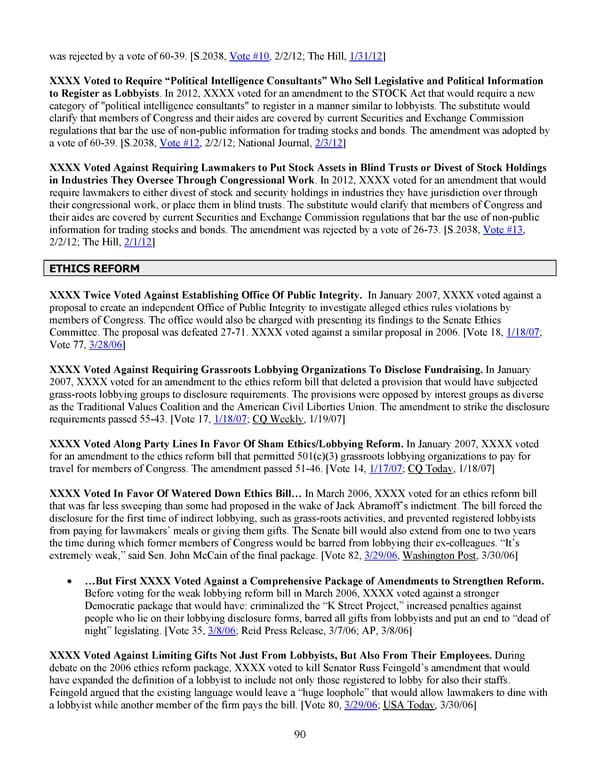was rejected by a vote of 60-39. [S.2038, Vote #10, 2/2/12; The Hill, 1/31/12] XXXX Voted to Require “Political Intelligence Consultants” Who Sell Legislative and Political Information to Register as Lobbyists. In 2012, XXXX voted for an amendment to the STOCK Act that would require a new category of "political intelligence consultants" to register in a manner similar to lobbyists. The substitute would clarify that members of Congress and their aides are covered by current Securities and Exchange Commission regulations that bar the use of non-public information for trading stocks and bonds. The amendment was adopted by a vote of 60-39. [S.2038, Vote #12, 2/2/12; National Journal, 2/3/12] XXXX Voted Against Requiring Lawmakers to Put Stock Assets in Blind Trusts or Divest of Stock Holdings in Industries They Oversee Through Congressional Work. In 2012, XXXX voted for an amendment that would require lawmakers to either divest of stock and security holdings in industries they have jurisdiction over through their congressional work, or place them in blind trusts. The substitute would clarify that members of Congress and their aides are covered by current Securities and Exchange Commission regulations that bar the use of non-public information for trading stocks and bonds. The amendment was rejected by a vote of 26-73. [S.2038, Vote #13, 2/2/12; The Hill, 2/1/12] ETHICS REFORM XXXX Twice Voted Against Establishing Office Of Public Integrity. In January 2007, XXXX voted against a proposal to create an independent Office of Public Integrity to investigate alleged ethics rules violations by members of Congress. The office would also be charged with presenting its findings to the Senate Ethics Committee. The proposal was defeated 27-71. XXXX voted against a similar proposal in 2006. [Vote 18, 1/18/07; Vote 77, 3/28/06] XXXX Voted Against Requiring Grassroots Lobbying Organizations To Disclose Fundraising. In January 2007, XXXX voted for an amendment to the ethics reform bill that deleted a provision that would have subjected grass-roots lobbying groups to disclosure requirements. The provisions were opposed by interest groups as diverse as the Traditional Values Coalition and the American Civil Liberties Union. The amendment to strike the disclosure requirements passed 55-43. [Vote 17, 1/18/07; CQ Weekly, 1/19/07] XXXX Voted Along Party Lines In Favor Of Sham Ethics/Lobbying Reform. In January 2007, XXXX voted for an amendment to the ethics reform bill that permitted 501(c)(3) grassroots lobbying organizations to pay for travel for members of Congress. The amendment passed 51-46. [Vote 14, 1/17/07; CQ Today, 1/18/07] XXXX Voted In Favor Of Watered Down Ethics Bill… In March 2006, XXXX voted for an ethics reform bill that was far less sweeping than some had proposed in the wake of Jack Abramoff’s indictment. The bill forced the disclosure for the first time of indirect lobbying, such as grass-roots activities, and prevented registered lobbyists from paying for lawmakers’ meals or giving them gifts. The Senate bill would also extend from one to two years the time during which former members of Congress would be barred from lobbying their ex-colleagues. “It’s extremely weak,” said Sen. John McCain of the final package. [Vote 82, 3/29/06, Washington Post, 3/30/06] …But First XXXX Voted Against a Comprehensive Package of Amendments to Strengthen Reform. Before voting for the weak lobbying reform bill in March 2006, XXXX voted against a stronger Democratic package that would have: criminalized the “K Street Project,” increased penalties against people who lie on their lobbying disclosure forms, barred all gifts from lobbyists and put an end to “dead of night” legislating. [Vote 35, 3/8/06; Reid Press Release, 3/7/06; AP, 3/8/06] XXXX Voted Against Limiting Gifts Not Just From Lobbyists, But Also From Their Employees. During debate on the 2006 ethics reform package, XXXX voted to kill Senator Russ Feingold’s amendment that would have expanded the definition of a lobbyist to include not only those registered to lobby for also their staffs. Feingold argued that the existing language would leave a “huge loophole” that would allow lawmakers to dine with a lobbyist while another member of the firm pays the bill. [Vote 80, 3/29/06; USA Today, 3/30/06] 90
 HRC vote skeleton Page 99 Page 101
HRC vote skeleton Page 99 Page 101